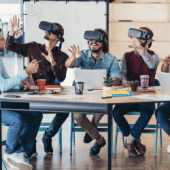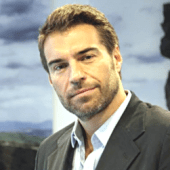It’s the end of the work as we know it, and I feel fine
IN BRIEF
- We’ve spent months asking questions about the future of work, and now we have some very educated guesses as to where this all leads.
- While some may want to return to the good old days, it’s becoming increasingly clear there’s no going back.
- Workers have options and will surely exercise them.
What is the future of work? It’s a simple question with complex answers.
The pandemic has had a profound impact on work, workforces, and workplaces, transforming them in unprecedented ways. Over the last two years, no aspect of business has been immune to the disruption and chaos it’s caused around the globe. Work was already in a state of change before the pandemic, but the pace of change accelerated greatly as offices closed, entire industries were upended, and many workers were forced to try to make work work from home.
We did, for the most part, pretty well. We rapidly adopted collaboration tools and technologies … and found backgrounds in our homes we were OK sharing with the rest of the working world. Now we find ourselves, hopefully, nearing the end. Or rather the beginning. Same as it ever was? Hardly.
In this Future of Work topic, VISION by Protiviti explores how we’ll work over the next decade and beyond. We bring together global perspectives from experts to examine how, where, when and even why we’ll work in the future.
We examine the topic from many angles: technology, culture and collaboration, talent and workforce, DEI, jobs, and the office of the future. Each of those areas, of course, requires a deeper dive into more nuanced areas. And we do so. We’re launching with 10 insights and will unveil three new ones each week through the end of April. We’ll also have two webinars featuring some of the experts we’ve tapped to help us tackle this topic.
We’ve spent months asking questions about the future of work, and now we have some very educated guesses as to where this all leads.
What did we learn? Well, while some may want to return to the good old days, it’s becoming increasingly clear there’s no going back. This is a one-way trip and it’s being powered by rocket fuel, so hold on. But as we hurtle toward an uncertain future filled with potential pitfalls and pain points, there is opportunity. In fact, there is “unprecedented opportunity” to redefine our future, says John Spataro, Corporate Vice President, Modern Work for Microsoft.
As a result, strategic-minded business leaders aren’t thinking only about next quarter or next year; they’re thinking about the next decade. This is a “once in a generation chance to rethink your business for success” in 2030 and beyond, says Graeme Codrington, Futurist, Future of Work expert, board advisor and author of “Future-Proof Your Uncertain Future” in his VISION by Protiviti podcast.
And there’s a workforce revolution coming, says Dr. Mauro Guillen, Dean of the Judge Business School at the University of Cambridge. Workers are empowered like they’ve never been before and we’re “on the verge of transformations of a magnitude not seen since the onset of the Industrial Revolution.”
Workers have options and will surely exercise them. Carla Harris, Vice Chair of Wealth Management at Morgan Stanley, told Fran Maxwell, our Global Lead of Workforce and Organizational Transformation, that workers “will either use this post-pandemic opportunity to migrate to the jobs they aspire to, or they’ll just create the ones they want.” Take note: The companies that figure out how to best navigate the wants and needs of employees and the jobs they’ll do will be the winners in the future, Harris said.
We hope these insights help you navigate the Future of Work over the next decade and beyond. We also have David Marino on the future of the office and corporate real estate, as well as Dr. Ayesha Khanna on game-changing technologies, such as AI, the metaverse and even gaming. And speaking of emerging technologies, we also take a look at quantum computing’s impact on the future of work with insights from our own Konstantinos Karagiannis.
We also have some intriguing findings from C-level research conducted with our partner, the University of Oxford. The exclusive “Protiviti-Oxford Executive Outlook on the Future of Work, 2030 and Beyond” global strategy report says, not surprisingly, business leaders say emerging technologies, such as AI, will be overwhelmingly transformative over the next decade. What is surprising, however, is nearly three quarters (74%) of those executives believe those technologies will add jobs over the next decade.
Finally, full disclosure: I “borrowed” this headline from Erica Sosna, Founder and CEO of Career Matters, and no doubt readers of a certain age will recognize it for its similarity to a REM song title from 1987. Erica’s brilliant, and we had a fascinating discussion about the future of careers on the VISION by Protiviti podcast. Erica is also featured in the webinar, VISION 2030: Exploring the Coming Workforce Revolution.
After talking with Erica, I think it's the second part of this headline that resonates most for me: And I feel fine. Really, after what we’ve been through the last few years, I’ll take it.
there’s a workforce revolution coming. we’re on the verge of transformations of a magnitude not seen since the onset of the Industrial Revolution.
– Dr. Mauro Guillen, Dean of the Judge Business School at the University of Cambridge




























